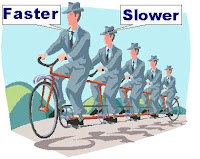
I consider myself a rather eco-conscious person and moderately spiritual. I won't make any claims to being a great religious scholar (and not particularly Christian), but one thing that persistently baffles me is how a good number of Christian folk use their faith as their basis for not caring about (or worse, willfully despoiling) the environment. I don't mean to Christian bash since I do know many kind hearted, good Christians. But I unfortunately seem to have run into a few that apparently haven't truly examined the teachings of their faith.
I'll use a recent
No Impact Man blog post as my launching point for discussion. The argument made by the religious Christian doubter of global climate change was:
"He [meaning God] promised never to send another flood--that polar ice will never melt and flood us again. His sovereignty will prevail--whether people believe in Him or not."
Ok, fair enough. If you believe that a divine flood will not be inflicted again, that's fine. But the Bible also states that "whatsoever a man soweth, that shall he also reap" (
Galatians VI). Maybe God won't be flooding us anytime soon, but that sure as heck isn't going to stop us from inflicting environmental catastrophe on ourselves. If we decide to pollute the Earth, we have to accept any potential consequences of our actions.
One thing that bothered me for a long time was that there was so much news about Christian doubters of global warming, and even a lot of fundamentalists outright denying any validity to the science. There are two issues going on here. One of them, the disconnect and lack of communication between science and religion, is a topic for another day. The other is what I think is a misguided skewing of Christian teaching to defend an unsustainable lifestyle. I've heard arguments using the Bible to defend driving SUVs and pillaging the Earth. I'm not entirely sure how Christian ideas got twisted into a defense of ecologically and socially unconscionable actions. I think the argument for SUVs was something along the lines of it being a Christian duty to protect one's family. All I have to say to that is "
what would Jesus drive"? I'm sure He wouldn't be driving around gas guzzling, environment polluting, overly large status symbol vehicles that endanger other drivers.
The most egregious thing I ever heard was the use of the passage from
Genesis about the Lord giving man dominion over the plants and animals of the world as a justification for being able to despoil the environment at will. That seems terribly
un-Christian to me since my [admittedly limited] understanding was that passage was meant to be more of a statement of being stewards of Earth rather than pillagers. It baffled me for the longest time how there could be devout Christians who were so incredibly anti-environment. Fortunately, there seems to be some pushback to sanity since
environmental Christian groups have been
arising.
As a final note, I'll bring up the Christian ideal of loving one's neighbor. Protecting the environment is just another way of loving one's neighbor. Polluting the environment has multitudes of interconnected and downstream effects which affect people. Air pollution results in acid rain (often distant from the site of pollution) and respiratory problems. Dumping waste into the waterways just isn't a good idea as it makes an essential resource less usable for large numbers of people. The sheer amount of electronic junk we carelessly dispose of often contains toxic substances which either leach into the environment or get shipped overseas where they poison people scavenging the waste. The list of environmental and social ills is pretty long. Being good stewards of the land comes with the added benefit of caring for your fellow men (and women). If you ask me, Jesus would have embraced the environmental cause with open arms.
 This week's news brings up a study which has results that fall squarely in the "no duh!" territory: a study from the Thomas Fordham Institute shows that concentrating efforts on bringing the lowest achieving students up to par drags down the highest achievers. Not terribly surprising. Public education has never been about fostering excellence. It's always been about getting people to a minimum standard with no incentive to push beyond that.
This week's news brings up a study which has results that fall squarely in the "no duh!" territory: a study from the Thomas Fordham Institute shows that concentrating efforts on bringing the lowest achieving students up to par drags down the highest achievers. Not terribly surprising. Public education has never been about fostering excellence. It's always been about getting people to a minimum standard with no incentive to push beyond that.
